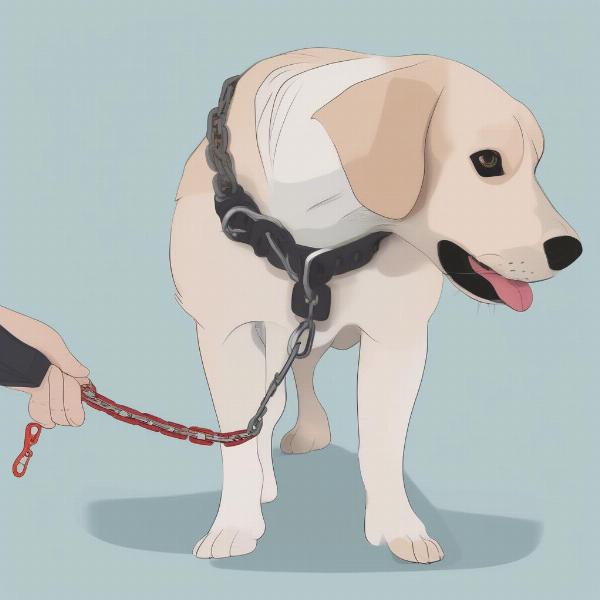Chain dog collars are a popular choice among dog owners, often chosen for their durability and classic look. However, it’s crucial to understand the different types of chain collars, their appropriate uses, and potential risks to ensure you’re making the best choice for your canine companion. This guide will delve into the world of chain dog collars, providing you with the information you need to make an informed decision.
Types of Chain Dog Collars
Chain collars come in various styles and materials, each serving a different purpose. Common types include slip chains, martingale chains, and choke chains. Slip chains tighten when pulled, offering control but posing a risk of choking if used incorrectly. Martingale chains offer a limited slip, making them a safer option for training. Choke chains, as the name suggests, tighten around the dog’s neck when pulled, and are generally considered less humane and potentially harmful. Choosing the right chain collar depends on your dog’s breed, size, and training needs.
Using Chain Dog Collars Safely and Effectively
While chain collars can be effective training tools, responsible usage is paramount. Never leave a chain collar on an unsupervised dog, as it can get caught and cause injury. Proper fit is crucial – a collar that’s too loose can slip off, while one that’s too tight can restrict breathing. When using a slip or choke chain, short, controlled corrections are key. Constant pressure or jerking can cause damage to your dog’s trachea and esophagus.
 Using a Chain Collar Safely
Using a Chain Collar Safely
Are Chain Collars Right for Your Dog?
Choosing the right collar is a crucial part of responsible dog ownership. While chain collars offer certain advantages, they’re not suitable for every dog. Puppies, small breeds, and dogs with respiratory issues should generally avoid chain collars. Furthermore, certain breeds with delicate necks, like Greyhounds, may be more susceptible to injury. Consider your dog’s temperament and training goals when making your decision. For everyday wear, a flat buckle collar is often a safer and more comfortable alternative. If you’re unsure whether a chain collar is right for your dog, consult a professional dog trainer or veterinarian.
Alternatives to Chain Collars
Several alternatives to chain collars offer similar control and training benefits without the potential risks. Harnesses, particularly front-clip harnesses, can provide excellent control without putting pressure on the dog’s neck. Head halters offer gentle guidance and are particularly helpful for dogs who pull. Flat buckle collars, combined with positive reinforcement training methods, are a reliable and comfortable option for everyday wear. Explore these options to find the best fit for your dog’s needs and your training style.
Choosing the Right Chain Collar Material
Chain collars are typically made from stainless steel, chrome-plated steel, or brass. Stainless steel is durable and rust-resistant, making it a popular choice. Chrome-plated steel is a more affordable option, but the plating can wear off over time. Brass offers a distinctive look but requires more maintenance to prevent tarnishing. Consider factors such as durability, weight, and aesthetic preference when selecting the material for your dog’s chain collar.
Conclusion
Chain dog collars can be effective training tools when used responsibly and with proper understanding. However, they are not suitable for all dogs, and careful consideration should be given to your dog’s breed, size, temperament, and training needs. Remember to prioritize your dog’s safety and well-being when making any decisions about their training and equipment. Always consult with a professional dog trainer or veterinarian if you have any questions or concerns.
FAQ
- Are chain collars cruel? When used incorrectly, chain collars can be harmful. Proper fit and gentle corrections are essential.
- Can I leave a chain collar on my dog all the time? No, chain collars should only be used during training sessions and never left on an unsupervised dog.
- What size chain collar should I get for my dog? Measure your dog’s neck and choose a collar that fits snugly but allows for two fingers to fit between the collar and the neck.
- What are the best alternatives to chain collars? Harnesses, head halters, and flat buckle collars are all safe and effective alternatives.
- What material is best for a chain collar? Stainless steel is generally the most durable and rust-resistant option.
- Can I use a chain collar on a puppy? It’s generally not recommended to use chain collars on puppies.
- Where can I find more information about dog training? Consult a professional dog trainer or explore reputable online resources.
ILM Dog is your one-stop resource for expert advice on dog care, training, and everything in between. We offer comprehensive guides on breed selection, health care, nutrition, grooming, and much more. Whether you’re a new dog owner or a seasoned pro, ILM Dog is here to help you provide the best possible care for your furry friend. Contact us today for personalized advice and support! Email: [email protected], Phone: +44 20-3965-8624. Visit us at ILM Dog.